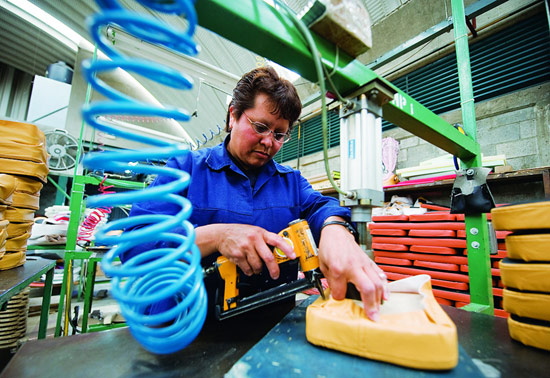Life Stages: Work and Professional Life
Most Mexicans start working at the age of 17 or 18. The Mexican Constitution prohibits employment of children under the age of 14 in any kind of work, although children aged 14 to 16 can work with approval from parents and state authorities.
Moving for Work
Mexicans are generally free to choose a profession that fits their qualifications and interests. Many youngsters from rural areas migrate to cities in search of high-paying jobs but change jobs frequently due to their lack of skills. This is adversely affecting traditional economic activities like agriculture in rural areas and creating socio-environmental problems in the cities as well.
Business hours in Mexico are between 9 a.m. and 7 p.m. with a one or two-hour break for lunch. Mexicans develop business contacts over lunch or socialize with their friends. Government offices operate from 9 a.m. to 4 p.m., and most banks are open from 9 a.m. to 5:30 p.m. Most workplaces are open from Monday to Friday.
An average white collar worker in Mexico works up to 40 hours a week and has flexible work timings. Blue collar workers or laborers have a six-day schedule and work an average of 48 hours per week with overtime and/or late evening shifts. Workers are paid double wages for the first nine hours of overtime beyond the weekly work hours of 48. If someone works more than nine hours of overtime or works on a legal holiday, Saturday, or Sunday, he or she receives triple wages.
Working Women
Women face more unemployment than men in the country, while people feel that lack of support from the government is a primary reason for unemployment. Those most affected by unemployment are those who live on a day-to-day basis without any savings. It is also common to see people from different age groups standing every morning on the sidewalks with placards describing their skills and seeking jobs.
The Mexican Constitution and labor laws provide that both sexes shall have equal rights and employment opportunities, with equal pay for equal work. The reality, however, is that women are paid less and hold lower-status jobs than men in the country. The majority of professionals and executives in government offices are men, while women represent only about 40 percent of the total workforce.
National Institute of Women statistics reveal that women earn half of what men earn at low-level positions while at the other end of the spectrum, women at the executive level earn only 78 percent of men’s salaries. Uneducated rural women suffer far higher rates of poverty. They end up working for long hours for low pay and are more susceptible to sexual harassment by their male employers. Moreover, women’s access to education and employment opportunities differs according to their ethnicity and class. The small numbers of white women from the upper class have a distinct advantage over their mestizo (mixed) and native Amerindian counterparts, who together comprise most of the population.
Mexican women are encouraged to work outside the home even after marriage. Working parents of nuclear families widely use childcare services, while relatives care for the children in extended families. Pregnant women and nursing mothers in Mexico are also entitled to special maternal aid, cash subsidies, and a layette if they are insured.
The official retirement age in Mexico is 65 years for both men and women, but this law is not very strictly followed and most people work as long as they live. Mexicans are entitled to a pension if they are over 65 years of age. Most companies initiate such plans for people over 55 or 60 or for those with a minimum service of 15 years.
Copyright © 1993—2024 World Trade Press. All rights reserved.

 Mexico
Mexico 
